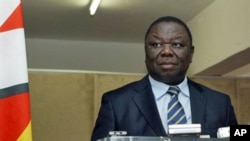Zimbabwe Prime Minister Morgan Tsvangirai says he and his colleagues in the unity government must continue to rebuild the country, despite difficulties and slow progress towards democracy. Mr. Tsvangirai and other Zimbabwean leaders were in Johannesburg for a recent investment conference.
The primary goal of Zimbabwe's transitional unity government is to stabilize the country and create a suitable environment for free and fair elections.
No one is sure when the elections will take place and some analysts fear elections without reconciliation will spark a return to the political violence in which about 200 of Morgan Tsvangirai's supporters were killed during the last polls in March 2008.
Glacial pace
But, some ministers in Prime Minister Tsvangirai's Movement for Democratic Change say Zimbabwe is slowly moving forward from the chaos and violence of the past 10 years.
One of the major difficulties faced by Zimbabweans is an erratic power supply resulting in lengthy power cuts. This has severely constrained the possibility of rebuilding mining, industry and agriculture.
The Movement for Democratic Change energy minister in the unity government, Elton Mangoma is upbeat about new investment in electricity. He says Zimbabwe will be self sufficient in power in three years through repairs and increased output from existing power stations and investment in new ones.
"We have already lined up investors, it is all sorted out," Mangoma said. "And then two greenfield investments, in coal, one at Sengwa and that is a 2,400 megawatt project, with a European country coming in."
Mangoma, like Mr. Tsvangirai, was arrested and beaten in detention under the previous ZANU-PF government. Mangoma says it is more important to try to rebuild Zimbabwe than to dwell on President Robert Mugabe and the past.
"Do you fight Mugabe every day or do you focus on achieving your objective? You have to commit yourself," Mangoma said. "We say we think we can work this thing through, and surely we have better insight. It is not out of stupidity. You do not achieve the growth rates we are getting if you are stupid ."
Exodus
During the political crisis of the past 10 years, ZANU-PF closed several newspapers, many journalists were arrested and some fled the country. One of those affected was Trevor Ncube, a Zimbabwean publisher who moved to South Africa several years ago.
Under the unity government he is now regularly back in Zimbabwe and recently launched a new daily newspaper, Newsday.
Ncube says one of the most pressing problems facing Zimbabwe is the lack of skills because so many people have left the country due to the political crisis.
"There simply is not the depth of skill in Zimbabwe," Ncube said. "The banking sector, the insurance industry and so forth is suffering. As a result quality of products, quality of service is lower than it has ever been in Zimbabwe."
He says many who left the country are nervous to return in case the inclusive government fails.
"A lot of people do not have confidence that what has been started is sustainable, that there will not be developments around the corner that are going to reverse the situation so that they are back to square one, having to deal with same issues that caused them to leave the country," Ncube said.
Black vs white
Although political violence has declined under the inclusive government and there are fewer partisan arrests, the situation for white commercial farmers and their workers has worsened.
Official statistics show that 90 percent of white commercial farmers, whose products provided 40 percent of Zimbabwe's foreign currency, have been evicted since 2000.
Pressure group Justice for Agriculture's John Worsley-Worswick said former commercial farm workers, now employed by new farmers who were given white-owned land, are among the poorest people in Zimbabwe.
"Those that remained internally displaced on commercial farms, who were forced to work for new farmers, were forced into a cashless existence where the work they were doing was paid for in kind," Worsley-Worswick said. "They were getting a couple of slices of bread, and tea a day, and at the end of the month if they worked a whole month, they would get a bucket of maize."
He said farm workers without cash cannot pay for health care or education for their children or buy subsidized food that is available on the former commercial farms. He said these farm workers are "slaves."
High hopes
Mr. Tsvangirai says although he is regularly disappointed by ZANU-PF's behavior within the inclusive government, there is hope for the future.
"Zimbabwe is moving forward," Tsvangirai said. "We have health workers and medicines in our hospitals, teachers and books in our schools, food in our supermarkets and granaries, water in our taps and fuel in our petrol stations. We have a dependable and stable multi-currency regime, a single digit inflation. And we have expected growth of over seven percent this year."
Last weekend, as people gathered in Harare and second city Bulawayo to discuss a new constitution, there was a spurt of political violence and arrests. Members of the public who attended some of the meetings blamed Mr. Mugabe's ZANU-PF for attacking and injuring some members of the public, throwing stones and aggressively disrupting meetings. Some journalists say they had to flee from ZANU-PF activists and the police.
Mr. Mugabe and Mr. Tsvangirai agreed two years ago that Zimbabwe needed a new constitution before new elections.
After the weekend violence and disruptions of public meetings on the constitution, Mr. Tsvangirai said that he will not take his MDC party into any new elections if there is political violence.











